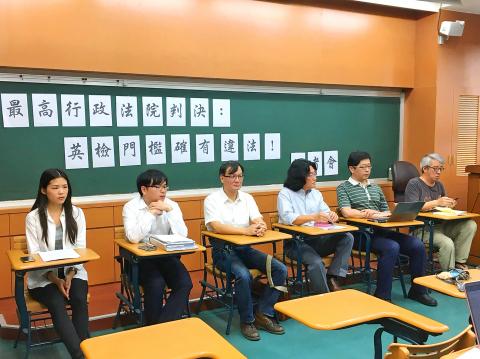A group of National Chengchi University (NCCU) students yesterday called on students across the nation to protest against school regulations requiring foreign-language proficiency exams.
The Supreme Administrative Court last month ruled that requiring students to take proficiency exams before they may attend remedial courses exceeds the parameters of university autonomy.
However, while NCCU in January abolished the foreign-language proficiency requirement, more than 100 universities in Taiwan still enforce such a requirement, said plaintiff Lai Yi-ling (賴怡伶), a graduate of the university.

Photo: Lin Hsiao-yun, Taipei Times
Student Rights Association leader Hsu Jen-yu (許人友) told a news conference that the association has launched an “abolish zero-credit courses” movement.
Universities should not offer fake courses, nor should they mandate arbitrary graduation standards, NCCU student council leader Chen Po-han (陳柏翰) said, adding that universities should return to offering regular courses to better enhance students’ English-language abilities.
“It is illogical to impose a rule that students may not attend remedial courses unless they have failed an exam,” Lai said.
In 2016, Lai sued NCCU for refusing to issue her diploma because she had not provided a language proficiency test score.
The court last month ruled in favor of NCCU, but said that university regulations demanding that students take foreign-language proficiency exams before they can attend remedial courses exceeds the parameters of university autonomy.
“Universities are given autonomy so they would be able to offer better education,” said lawyer Chen Yi-tsung (陳易聰), who is representing Lai pro bono.
Current regulations “do not fit the goal of education,” Chen Yi-tsung added.
While the ruling seemed to be in the university’s favor, it has nonetheless pointed out the logical fallacy behind language proficiency tests, so it actually favors students, he said.
Hopefully, the majority of universities would observe the court ruling and return to the essential tenets of education, Lai said.
NCCU Department of Sociology director Huang Hou-ming (黃厚銘) said that the tests, originally intended to promote globalization, have become vapid and funnel students toward either British or American English.
While the case was an individual incident, the ruling says that university autonomy must remain rational, NCCU Department of Law associate professor Chen Chih-hui (陳志暉) said.
Determining student capabilities is a university’s task, and ensuring that students meet the standard is the true function and goal of universities, and should not be contracted to outside companies, Chen Chih-hui said.
NCCU Department of Radio and Television professor Kuo Li-hsin (郭力昕) said that he harbors no ill will toward the English language — having studied in the US and the UK for his master’s and doctoral degrees — but examinations do not allow students to become more fluent.
Exams instead make English a superior language to which people should aspire, a common reaction in post-colonial nations, Kuo said.

Nipah virus infection is to be officially listed as a category 5 notifiable infectious disease in Taiwan in March, while clinical treatment guidelines are being formulated, the Centers for Disease Control (CDC) said yesterday. With Nipah infections being reported in other countries and considering its relatively high fatality rate, the centers on Jan. 16 announced that it would be listed as a notifiable infectious disease to bolster the nation’s systematic early warning system and increase public awareness, the CDC said. Bangladesh reported four fatal cases last year in separate districts, with three linked to raw date palm sap consumption, CDC Epidemic Intelligence

Two Taiwanese prosecutors were questioned by Chinese security personnel at their hotel during a trip to China’s Henan Province this month, the Mainland Affairs Council (MAC) said yesterday. The officers had personal information on the prosecutors, including “when they were assigned to their posts, their work locations and job titles,” MAC Deputy Minister and spokesman Liang Wen-chieh (梁文傑) said. On top of asking about their agencies and positions, the officers also questioned the prosecutors about the Cross-Strait Joint Crime-Fighting and Judicial Mutual Assistance Agreement, a pact that serves as the framework for Taiwan-China cooperation on combating crime and providing judicial assistance, Liang

Reports of Taiwanese going missing, being detained or interrogated, or having their personal liberties restricted in China increased about fourfold annually last year, the Mainland Affairs Council (MAC) said yesterday. Last year, 221 Taiwanese who traveled to China were reported missing, were detained and interrogated, or otherwise had their personal freedom restricted, up from 55 the previous year, the council said. Reopening group tours to China would be risky, as it would leave travelers with no way to seek help through official channels after Beijing shut down dialogue between the associations tasked with handling cross-strait tourism, the MAC said. Taipei’s Taiwan Strait Tourism

SHIFT: Taiwan is evolving from a transit stop into a tourist destination, with more international travelers willing to spend on tours, dining and cultural activities Taiwan rose three places in the World Tourism Barometer to 36th globally in 2024, with international tourism revenue of US$10.028 billion, the Tourism Administration said on Monday. The UN Tourism Organization publication said that its focus has switched from whether a country has returned to pre-COVID-19 levels of tourism to the amount spent by a tourist during an overseas trip. The nation last year welcomed 8.57 million international tourists, about 9 percent more than in 2024, with most tourists coming from Japan, South Korea, and Hong Kong and Macau, all of which accounted for at least 1 million tourists each. During the first